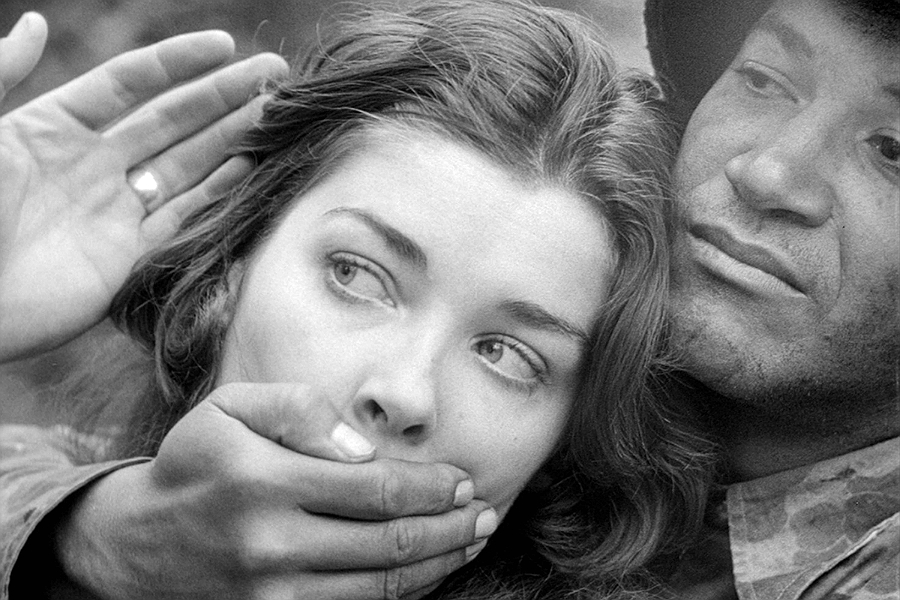Stanley Kubrick’s Fear and Desire

DW Mault on Fear And Desire, the debut denounced by Stanley Kubrick…
Cinema, like life, is the very element of subjectivity and sometimes the people closest to something miss what is apparent only to the rest of humanity via those unforgiving masters: time, space (both negative and positive) and breaths of knowledge we never knew where there.
Stanley Kubrick’s hated (to him) debut film Fear And Desire is one such artefact and experience. For years a whisper that now has moved on to such diverse legends as the films maudit: Orson Welles’ The Other Side Of The Wind and Jerry Lewis’s The Day The Clown Cried (two widely opposed films, but that’s the beauty). Films like Fear And Desire finally appearing gives junkies of the art christened Cine hope that one day, one day (indeed)…
The great DVD label Masters Of Cinema gives us a chance to see Fear And Desire in all it’s glory (either Blu-Ray or DVD), with the addition of Kubrick short documentaries: Day of the Fight (1951) / Flying Padre (1951) / The Seafarers (1953), as well as the usual detailed booklet and commentaries. In addition to this act of benevolence there is a national tour of the film which arrives at FACT on Monday evening.
Unfairly, Fear And Desire has been looked at out of interest, because of the hope that we can see genesis in action; a chance to peer at the beginnings of a true titan that evolved from depictions of the folly of man at his most animalistic towards a Socratic argument about life, existence and free will. Fear And Desire is more than this simplistic act of creative voyeurism.
Fear And Desire was self financed to the tune of $10,000 and crewed by Stanley, his then wife Toba Metz and four Mexican labourers. Written by his school friend Howard Sackler (Sackler later won the Pulitzer Prize for his 1968 drama The Great White Hope) it tells the tale of four soldiers whose plane has crashed behind enemy lines and their attempts to evade capture and escape to safety.
Kubrick later denounced Fear And Desire as “amateurish”, saying he considered it “like a child’s drawing on a fridge. A bumbling, amateur film exercise… a completely inept oddity, boring and pretentious.”
So is it pretentious? Of course it is, but it has ideas to burn (some of which work and some of which don’t), but by watching you see a unique creative mind at work. You see someone experimenting, the very idea that someone (not by me) acclaimed as the greatest of the great did not come fully formed but was allowed time to develop; a time to make mistakes and BE pretentious (a word I would never use as a pejorative) is something to give thanks for.
Rewatching Fear And Desire made me fall back a little in lust with Stanley Kubrick; it was very much a palate cleanser. It makes you realise that before this film Kubrick was an acclaimed photographer and this is what I mean when I talk about the difference between filmmakers who are hardwired with what Truffaut called the language of cinema.
A short digression: Alan Clarke made the majority of his films for TV but in his bones he was a true filmmaker; while someone like Danny Boyle, Shane Meadows or Tom Hooper are the creators of diverting television that just happens to screen in cinemas…
And we’re back… Case in point Howard Sackler’s script is theatrical in the extreme, but Kubrick takes it by the scruff of the neck and makes it poetic cinema at it’s finest. Whether via extreme close ups (that prefigure Don McCullin’s photographs of US soldiers in Vietnam), characters talking straight to camera, or audacious moments of pure cinema that utilises themselves in editing that juxtaposes food and death (that’s Damien Hirst’s whole career, right there in a matter of moments).
The worst draw dropping devices that Kubrick throws at the fourth wall is interior monologue (very much not voice over), that element of formal exposition that is now regarded as Malickian. Fear And Desire is Malick before Malick; The Thin Red Line before Malick. As I said it’s a genesis film, not just of Kubrick but of many others that have tread the path of personal cinema masquerading as cinematic modernism. Looking back at Fear And Desire, it echoed through American Cinema for good or ill, like a ur-text that was so before it’s been forgotten.
It’s not just the interior monologues that prefigure Terrence Malick, it’s the idea of the uselessness of language (and the problems that it brings) compared to our inner thoughts; but most of all it’s the Edenic fall that hit man, which mean he can’t decide whether we’re beasts in search of original sin and free will, or whether we drive on and become stoical before the stoics. All of this of course is every Malick film, especially The New World and The Tree Of Life (among others).
I said earlier that Fear And Desire made me fall in lust with Stanley again. That’s true but what it made me realise is that the reasons why he’s so great is because even here (where he’s only partly successful) he’s only interested in the big questions; here he starts hunting big game (all day every day) when his more experienced contemporaries are only interested in hunting rabbits at weekends.
At the end of this short film (62 minutes) we are left with two duelling philosophical ideas: Hegel’s Master/Slave dialectic, and the now very trendy Joseph Campbell’s notion, that of man’s attempt to fight dragons and how we must use the dragon to bind himself to his ego before it’s too late. All this of course has always interested those big game hunters of philosophical cinema; which leads us to the banal question that needs to be put to bed. That of the idea of Kubrick’s heir. Laughably, people are able to say that the crown belongs to Christopher Nolan, but in fact no, there is no crown to be taken.
We must only see what is in front of us and the only American artist who just made a 144 minute debate about both Hegel’s aforementioned Master/Slave dialectic and the internal battle for a successful life. A filmmaker like Kubrick snubbed by those mafia of the mediocre that make up anglo-saxon prize givers… But of course PT Anderson i,s like Kubrick, too good for banal titles like “the new” whoever; he is in fact, like Kubrick and others, unique and intellectually terrifying to the room full of blind men that acclaims the one eyed man to be King. Whether that King is Nolan (a creative pauper who thinks he’s a genius) or everyone’s favourite non-entity: Quentin Tarantino; the man who convinced the Western World that flabby neo-exploitation cinema is the way to right wrongs. It would be so very gauche to say…
Ultimately Fear And Desire is all there in the title; an opus to doubt, the doubt that exists in the minds of all. Generals, Sergeants, it matters not a jot, for we all only play at being human while in our inner thoughts we know the ugly truth. The truth is of course that we welcome death to stop the chattering of our consciousness (which never stops), which, in fact, is the never ending fight between sanity and madness that is the road that we all try not to swerve off.
DW Mault
Fear And Desire is available to buy on Blu-Ray and DVD from Masters Of Cinema, and screens 9pm today @ FACT





